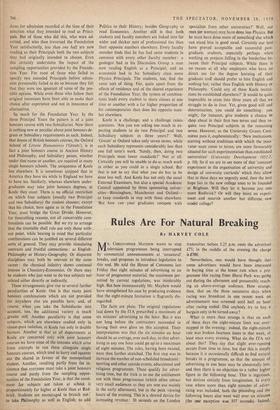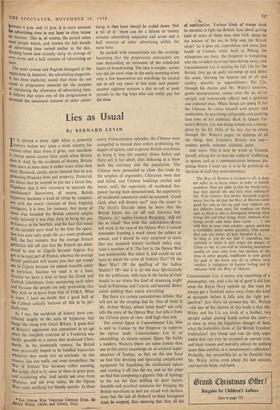Rules Are For Natural Breaking
By HARVEY COLE R. CHRISTOPHER MAYHEW wants to stop television programmes being interrupted by commercial announcements at 'unnatural' breaks, and proposes to introduce legislation to this end. He told the House of Commons last Friday that eight minutes of advertising to an hour of programme material, the maximum per- mitted by current regulations, was' intolerably high. But how immeasurably Mr. Mayhew would have strengthened his case by producing evidence that the eight-minute limitation is flagrantly dis- regarded.
The facts are plain. The original regulations laid down by the ITA prescribed a maximum of six minutes' advertising to the hour: But• it was not long before the contractors succeeded in having their own gloss on this accepted. Their interpretation was that the six minutes an hour should be an average, over each day, so that adver- tising in any one hour could go up to a maximum of eight minutes. The rules, having been twisted, were then further stretched. The first step was to increase the number of non-scheduled broadcasts : sporting and other outside events, educational and religious programmes. These qualify for adver- tising time, but the trick is to use the entitlement not with these programmes (which often attract very small audiences as they are sent out mainly in the early afternoon), but in the peak viewing hours of the evening. This is a shrewd device for increasing revenue : 30 seconds on the London transmitter before 5.25 p.m. costs the advertiser £75; in the middle of the evening the charge is £700.
Nevertheless, one would have thought that some advertisers would have been interested in buying time at the lower rate when a pro- gramme like racing from Hurst Park was going out during the afternoon and presumably reach- ing an above-average audience. How strange, then, that on the three successive days when racing was broadcast in one recent week no advertisement was screened until half an hour after racing ended. Did anybody try to buy a bargain only to be turned away?
What is more than strange is that on each of these days the eight-minute limit was over- stepped in the evening : indeed, the eight-minute rule was broken fourteen times in that week, at least once every evening. What do the ITA say about this? They .say that slight over-running occurs from time to time, but that this is simply because it is occasionally difficult to find natural breaks in a programme, so that the amount of advertising in one hour may be abnormally low, and then there is no objection to a rather higher figure in the following hour. This is ingenious, but derives entirely from imagination. In every case where more than eight minutes of adver- tising was included, both the preceding' and the following hours also went well over six minutes (the one exception was 357 seconds). Indeed, iktween 6 p.m. and 11 p.m. it is most unusual advertising time in any hour to drop below Six minutes. This is, of course, the period when most people watch, and receive the full benefit of advertising time earned earlier in the day. Evening hours now actually carry an average of over seven and a half minutes of advertising an hour.
The most cynical and flagrant disregard of the regulations is, however, the advertising magazine. It has been explicitly stated that these do not count as programme material for the purpose of calculating the allowance of advertising time. It follows that when one of the programmes is screened the maximum amount of other adver- tising in that hour should be scaled down. Not a bit of it: there can be a fifteen or twenty minutes advertising magazine and seven and a half minutes of other advertising within the same hour.
So packed with commercials are the evenings becoming that the programme contractors are now demanding an extension of the scheduled hours of broadcasting. The idea is simple: screen any old (or new) tripe in the early morning when only a few housewives are watching; be careful not to sell any space at this time, and presto! another eighteen minutes a day to sell at peak periods to the big boys who can really pay for the time.































































 Previous page
Previous page